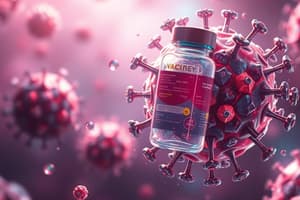Podcast
Questions and Answers
What type of immune response is primarily induced by killed vaccines?
What type of immune response is primarily induced by killed vaccines?
- Cell-mediated immunity
- Humoral antibody response (correct)
- Innate immunity
- Adaptive immunity
In comparison to attenuated vaccines, how do killed vaccines perform in terms of cell-mediated immunity?
In comparison to attenuated vaccines, how do killed vaccines perform in terms of cell-mediated immunity?
- Equally effective
- More effective
- Only slightly less effective
- Less effective (correct)
Which of the following statements about killed vaccines is correct?
Which of the following statements about killed vaccines is correct?
- They induce both humoral and cell-mediated immunity equally.
- They predominantly induce a humoral antibody response. (correct)
- They are more effective than attenuated vaccines.
- They induce a stronger cell-mediated immunity than humoral response.
What is a characteristic of attenuated vaccines compared to killed vaccines?
What is a characteristic of attenuated vaccines compared to killed vaccines?
Which type of vaccines are typically less effective in inducing cell-mediated immunity?
Which type of vaccines are typically less effective in inducing cell-mediated immunity?
What is the primary characteristic of live attenuated vaccines?
What is the primary characteristic of live attenuated vaccines?
How do inactivated vaccines function?
How do inactivated vaccines function?
What type of vaccine is typically composed of sugar molecules from the surface of bacteria?
What type of vaccine is typically composed of sugar molecules from the surface of bacteria?
What is the main purpose of recombinant vaccines?
What is the main purpose of recombinant vaccines?
What does immunity primarily refer to in the context of vaccination?
What does immunity primarily refer to in the context of vaccination?
Flashcards
Killed Vaccines
Killed Vaccines
Vaccines made from killed pathogens, usually inducing a primarily antibody-based immune response.
Humoral Antibody Response
Humoral Antibody Response
An immune response that produces antibodies targeting specific pathogens.
Attenuated Vaccines
Attenuated Vaccines
Vaccines using weakened forms of pathogens, which often more effectively stimulate cell-mediated immunity.
Cell-mediated Immunity
Cell-mediated Immunity
Signup and view all the flashcards
Killed vs. Attenuated Vaccines
Killed vs. Attenuated Vaccines
Signup and view all the flashcards
Live attenuated vaccines
Live attenuated vaccines
Signup and view all the flashcards
Inactivated vaccines
Inactivated vaccines
Signup and view all the flashcards
Polysaccharide vaccines
Polysaccharide vaccines
Signup and view all the flashcards
Recombinant vaccines
Recombinant vaccines
Signup and view all the flashcards
Vaccine-preventable diseases
Vaccine-preventable diseases
Signup and view all the flashcards
Study Notes
Principles of Vaccination
- Vaccination is the process of eliciting a long-lived state of protective immunity against a disease-causing pathogen.
- Exposure to a live pathogen, followed by recovery, is a natural form of immunization.
Immunity
- Immunity is the body's ability to tolerate its own material ("self") and eliminate foreign material ("non-self").
Types of Immunity
Passive Immunity
- Preformed antibodies are transferred to a recipient, often occurring naturally when maternal IgG crosses the placenta or through injection of preformed antibodies.
- Homologous pooled human antibody (immune globulin): Combined IgG from many donors, used in prophylaxis for hepatitis A and measles.
- Homologous human hyperimmune globulins: Antibody products with high titers of specific antibodies, used against hepatitis B, rabies, and tetanus.
- Heterologous hyperimmune serum (antitoxin): Produced in animals (usually horses), containing antibodies against a single antigen. Used to treat botulism and diphtheria.
- Monoclonal antibody: Produced from a single B cell clone, targeting a singular antigen or closely related group. Used in cancer treatment (chronic lymphocytic leukemia), transplant rejection prevention, and autoimmune disease treatment (rheumatoid arthritis).
Active Immunity
- Active immunity stimulates the immune system to produce antigen-specific antibodies.
- Unlike passive immunity, active immunity often lasts for many years.
- The persistence of protection is known as immunologic memory.
Vaccines
- Vaccines are biological preparations derived from living organisms and designed to enhance immunity to diseases.
- They can be prophylactic (preventative) or therapeutic (treating).
- Vaccines interact with the immune system to produce an immune response similar to a natural infection, without the risk of the disease.
Types of Vaccines
Live Attenuated Vaccines
- Microorganisms are weakened so they lose disease capability but still replicate.
- Jenner's smallpox vaccine is an example.
- Attenuation often involves growing the pathogen under atypical culture conditions.
- Example: Bacillus Calmette-Guérin (BCG).
- Advantages: Induce cell-mediated responses, typically requires a single dose.
- Disadvantages: Potential for reversion to a pathogenic form, must be handled safely.
Inactivated Vaccines
- The pathogen is killed using heat or chemicals.
- It cannot replicate but still induces an immune response.
- Examples include the Salk polio vaccine.
- Safety profiles tend to be higher than live attenuated vaccines.
- Often require multiple boosters to achieve full protection.
- Mostly induce humoral immunity (antibody response)
Subunit Vaccines
- Contain only specific, purified macromolecules from the pathogen (e.g., antigens).
- Examples include inactivated exotoxins (toxoids), capsular polysaccharides, and recombinant protein antigens.
- Provide protection against the disease without the whole microorganism.
Toxoid Vaccines
- Derived from inactivated bacterial toxins.
- Induce the production of antitoxins which neutralize the effects of the toxins.
- Example: Tetanus and diphtheria vaccines.
Capsular Polysaccharide Vaccines
- Contain the polysaccharide capsule from bacteria.
- The capsule helps avoid immune system recognition.
- Coating with antibodies or complement enhances macrophage and neutrophil phagocytosis.
- Example: Streptococcus pneumoniae vaccine, and Neisseria meningitidis vaccine.
Recombinant Vector Vaccines
- Use attenuated viruses or bacteria as vectors.
- The vector is modified to carry genes encoding key antigens of pathogens.
- Replication within the host results in antigen production.
- Minimizes the chance of harmful reversion to a normal state .
DNA Vaccines
- Employ plasmid DNA encoding antigenic proteins.
- Delivered into the muscle and expressed inside the host.
- Can be beneficial for long-lasting immunity.
- May require booster shots for enhanced protection.
Studying That Suits You
Use AI to generate personalized quizzes and flashcards to suit your learning preferences.




